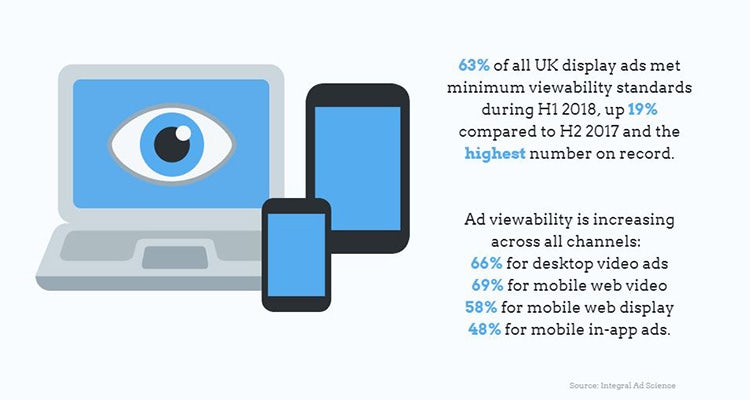Ad viewability, online FMCG, sponsorship: 5 killer stats to start your week
We arm you with the numbers marketers need for the coming week, including the latest ad viewability figures and growth of FMCG ecommerce.
Netflix is the most positively talked about brand among millennials
Netflix retains its title as the most positively talked about brand among 18- to 34-year-olds, topping the ranking for the second year in a row.
The streaming giant sits at the top with a score of 76.5%, above Spotify in second on 72.9%, Primark (71.2%), Apple (70.7%) and Facebook (69.9%).
The rest of the top 10 is made up of McDonald’s (69.5%), PlayStation (69.2%), iPhone (69%), Airbnb (68.8%) and Ikea (67.5%).
The ranking also looks at the brands that have seen the greatest uplift in positive word of mouth over the past 12 months. Cinema chain Vue tops this list, with a rise in score of 11%.
Source: YouGov
Ad viewability hits record high in the UK

Nearly two-thirds (63%) of all UK display ads met minimum viewability standards during the first half of 2018, up from 53% in the second half of last year and the highest number on record.
Ad viewability is increasing across all channels, hitting 66% for desktop video ads, 69% for mobile web video, 58% for mobile web display and 48% for mobile in-app ads.
Display and mobile ads are deemed viewable if 50% of the ad unit in view for one continuous second. For large display ad formats 30% of the ad unit must be in view for one continuous second, and for video ads 50% of the ad unit in view for two continuous seconds, according to the Media Rating Standard (MRC).
Meanwhile, risk to brand safety declined during the period, with 4.5% of display ads being flagged as served in environments considered to pose a risk to a brand’s image, down from 5.8% in the second half of 2017.
Source: Integral Ad Science
Global sponsorship spend to rise 5%

Advertisers are expected to spend $66bn (£50.6bn) on sponsorship globally in 2018, up 4.9% on last year.
North America makes up the greatest share of spend (36.8%), followed by Europe (26.7%), Asia-Pacific (25.2%), Latin America (7%), and the Middle East & Africa (4.3%).
Most of this money is being invested in sport, such as the FIFA World Cup in Russia, which is thought to have attracted $1.7bn worth of deals.
However, just 19% of sponsorship professionals are confident they can measure the ROI of the sponsorships they undertake, and only 37% have a standardised process for measuring sponsorship.
Source: Warc
Global online FMCG sales to hit $400bn by 2022

Global online sales of FMCG products are growing four times faster than offline sales, as people increasingly opt for convenience and speed, with total sales expected to reach $400bn (£307bn) by 2022.
European markets are expected to provide significant growth opportunities for FMCG ecommerce over the next five years, with 26% of consumers already using online platforms for home delivery of products.
The UK is leading the total share of FMCG online sales (6.3%) in Western Europe, closely followed by France (6.1%), Switzerland (1.8%), Italy (1.7%) and the Netherlands (1.5%).
Source: Nielsen
Marketers would change jobs for better flexible working

The vast majority (96%) of marketers feel flexible working is important to them, yet 29% don’t have access to any flexible working options.
Working from home is by far the most common form of flexible working offered, followed by flexitime and then time off in lieu.
Most marketers would opt for better flexible working over a promotion or salary increase, and 71% would move to a new role if it offered more flexible working, while 41% would consider leaving the industry altogether if they weren’t offered flexible working.
Source: Tarsh Partnership








